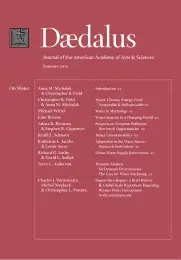Introduction
There is no resource more central to life on Earth than water, and its role in shaping the arc of human history cannot be overstated. Whether through its presence or absence, water has both fueled the growth of the world’s great societies and hastened their demise. Humanity’s need for water is inextricably linked to its need for security, energy, food, and community. At the same time, climate change, population growth, and economic development are currently placing unprecedented demands on this limited resource, as well as increasing the uncertainty associated with future demands and availability. As with all limited resources, both challenges and opportunities emerge as resources become scarcer; it is how societies and ecosystems respond to such “stresses” that determines their fate.
When we first embarked on the development of an issue of Dædalus on the topic of water, we considered a number of ideas about how to organize and frame both the individual contributions and the issue overall. As researchers focusing on the functioning of the earth system and humankind’s role in altering this system, the challenges surrounding humanity’s use of–and need for–water seemed to us all too clear. Rather than organizing the collection of articles around a series of problems and failures, however, we were quickly drawn instead to the idea of framing current issues within the context of the decisions that we face and the opportunities that emerge as we are confronted with increasing demands on a limited resource. We hope that we have been successful in this endeavor, and that a sense of opportunity accompanies the sense of severity and urgency in the individual perspectives that make up this collection. If necessity is indeed the mother of invention, then we must be on the cusp of some unprecedented creativity!
It has been an honor and a great pleasure to work with some of the world’s leading water scholars as this special issue has taken shape, and it is with great excitement that we share the final product with the readership of Dædalus.
